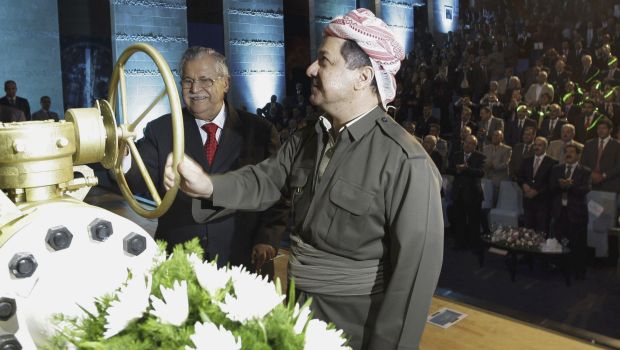
In this June 1, 2009 file photo, Kurdish president Massud Barzani, right, and Iraqi President Jalal Talabani open a ceremonial valve during an event to celebrate the start of oil exports from the autonomous region of Kurdistan, in the northern Kurdish city of Erbil, Iraq. (AP Photo/Safin Hamed, Pool, File)
A press release posted by the ministry on its website said the export of oil extracted from fields in the autonomous Kurdish region without its approval was a violation of the country’s constitution, “causes damage to the economy as well as the federal budget of the country,” and was having a detrimental effect on national sovereignty.
The ongoing oil dispute between the federal government in Baghdad and the Kurdistan region has threatened to boil over in recent weeks after Erbil announced it had made its first sale of oil, shipping one million barrels stored at the Ceyhan Port in Turkey to an unnamed European destination—the first of many, it said.
Erbil has admitted it has been pumping oil to the Ceyhan Port for storage for some months now but denies allegations it has been exporting oil without Baghdad’s approval since 2010. Exports from the region used to reach world markets via a Baghdad-controlled pipeline, but were later halted due to a payments dispute between Baghdad and oil companies operating in the region.
Baghdad considers the export of Kurdish oil carried out independently of its state-owned oil company as “smuggling,” and has said it would sue all those involved in the export of oil from the Kurdistan region as well as seek international arbitration over the issue.
The head of the KRG’s Natural Resources Committee, Sherko Jawdat, told Asharq Al-Awsat that Erbil’s oil export activities were entirely within the framework of the Iraqi constitution. “Baghdad has no legal basis to sue any of the involved parties [in the sale of oil from the Kurdistan region],” he said. “The region’s export of oil is entirely legal and constitutional.”
Erbil maintains the matter is an internal one, saying it wants to resolve the issue “within the framework of Iraq’s constitution.”
“This dispute over oil and gas must be resolved using a special independent court,” Jawdat said.
As a result of the dispute Baghdad has since January cut off the Kurdistan’s 17 percent share of this year’s Iraqi budget—around 17 billion dollars—as well as freezing or delaying payment of all public sector wages in the Kurdistan region.
“Whether or not Baghdad has been harmed by the export of the [Kurdistan] region’s oil, we must first look at the conditions [endured by] the region’s residents who have been harmed by Baghdad’s unilateral and illegal decision to cut of the region’s dues [its share of the Iraqi budget and public sector wages],” said Jawdat.
“Before speaking about harm, Baghdad should have—and we don’t expect it to any time soon—spoken about the ordinary Iraqi citizens in the Kurdistan region whose lives are in danger since Baghdad imposed this economic siege on the region, one which has caused the biggest economic crisis for the region—and it is a crisis of bread—due to the public sector wages which have been cut.”
The KRG claims the Kurdistan region holds some 45 billion barrels of oil in reserves. It announced in May it had signed a number of contracts independently of Baghdad with several major global oil companies, despite objections from Baghdad.
